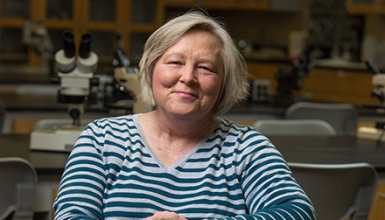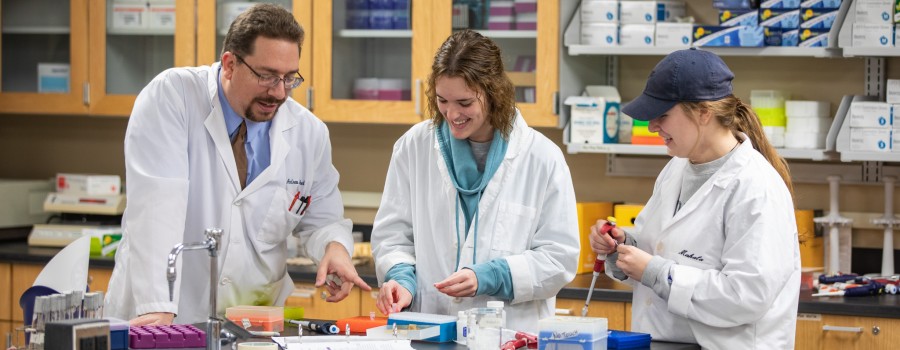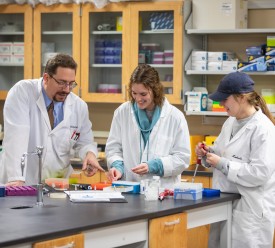Unlock the mysteries of life with our Biology Program!
Biology, the cornerstone of life's understanding, presents an exciting opportunity to unearth its enigmatic truths. At University of the Cumberlands, our bachelor’s degree in biology grants you access to a comprehensive exploration of diverse biological sciences, ranging from the intricacies of human life to the complexities of molecules, plants, and diseases.
Our Bachelor of Science in Biology program is led by seasoned faculty and offers immersive courses and captivating experiments in cutting-edge laboratories. Through hands-on learning experiences, access to private study spaces, and state-of-the-art computer labs, you'll thrive in an environment that fosters academic excellence and prepares you for the future.
Engage in research that resonates with your passion, uncover new revelations, and demonstrate biology's pervasive influence on the world around you with a biology degree!
By the numbers
Programs & Requirements
* The credit hours listed on this page only reference the specific program requirements and is not reflective of the total hours necessary to receive your bachelor's degree in biology. Cumberlands requires all students obtain a minimum of 60 hours for an associate’s degree and a total of 120 hours for a bachelor’s degree. Transfer and prior learning credits may be counted toward those totals.
To learn more about our General Education Requirements, please visit the page referenced below or explore our Academic Catalog.
Bachelor of Science in Biology
Hands-on research. Challenging internships. Incredible careers. Long-lasting relationships with mentors and colleagues who value you and inspire you. All these opportunities and more open up to you with a Bachelor of Science in Biology from University of the Cumberlands. You can even choose an emphasis area to better suit your biology degree to your personal interests and career goals: pre-professional health, education dynamics, cellular and molecular biology, biodiversity, or pre-physician assistant.
Course Requirements
- BIOL 113 - Introduction to Population Biology Laboratory
- BIOL 114 - Introduction to Cellular Biology Laboratory
- BIOL 133 - Introduction to Population Biology
- BIOL 134 - Introduction to Cellular Biology
- BIOL 210 - Introduction of Biological Literature
- BIOL 246 - Biodiversity
- BIOL 340 - Genetics
- BIOL 495 - Senior Seminar OR BIOL 498 - Senior Thesis
Students taking more than one biology integrated studies course will only get upper division biology credit for the first one.
Choose 1 Biology Emphasis area and Choose 18 credits in that Emphasis area. See Biology Emphasis Requirements.
A Bachelor of Arts requires all the same courses as a Bachelor of Science with the addition of four classes (12 hours) in a foreign language.
Choose one foreign language sequence:
- FREN 131 Elementary French I
- FREN 132 Elementary French II
- FREN 231 Intermediate French I
- FREN 232 Intermediate French II
- SPAN 131 Elementary Spanish I
- SPAN 132 Elementary Spanish II
- SPAN 231 Intermediate Spanish I
- SPAN 232 Intermediate Spanish II
Bachelor's in Biology – Emphasis Options
Some professions require additional schooling upon completion of a bachelor’s degree in a relevant field. A bachelor's degree in biology from Cumberlands offers the challenge, knowledge, and skills you need to step into a graduate program as you pursue a career in medicine, dentistry, pharmacy, veterinary sciences, and physical therapy.
Course Requirements
The following courses are taken in addition to your Bachelor of Science in Biology to secure an emphasis.
Students interested in graduate studies in this, or related fields are strongly encouraged to take the following: Organic I and II, Physics I and II, Calculus, and Probability and Statistics. Students interested in entering the workforce upon graduation are encouraged to complete an internship during the summer before their junior and/or senior years.
- BIOL 331 - Vertebrate Embryology
- BIOL 332 - Poisonous and Medicinal Plants
- BIOL 341 - Plant Taxonomy
- BIOL 342 - Parasitology
- BIOL 347 - Invertebrate Zoology
- BIOL 349 - Plant Biology
- BIOL 404 - Bioethics
- BIOL 431 - Conservation Biology
- BIOL 442 - Comparative Anatomy
- BIOL 460 - Special Topics in Biology and Independent Research
- BIOL 448 - General Ecology
Students interested in pursuing graduate studies in Cellular and Molecular Biology are strongly encouraged to pursue a minor in Chemistry and take the following: Calculus I and II and Physics I and II and BIOL 498 - Senior Thesis. Students interested in entering the workforce upon graduation are encouraged to complete an internship during the summer before their junior and/or senior years.
Required Courses:
- BIOL 345 - Microbiology
- BIOL 346 - Biochemistry
- BIOL 445 - Molecular Biology
- BIOL 446 - Advanced Cell Biology
Recommended Courses:
- BIOL 331 - Vertebrate Embryology
- BIOL 332 - Poisonous and Medicinal Plants
- BIOL 342 - Parasitology
- BIOL 345 - Microbiology
- BIOL 346 - Biochemistry
- BIOL 404 - Bioethics
- BIOL 436 - Medical Biochemistry
- BIOL 441 - Immunology
- BIOL 443 - General Physiology
- BIOL 445 - Molecular Biology
- BIOL 446 - Advanced Cell Biology
- BIOL 447 - Histology AND
- BIOL 343 - Human Anatomy OR BIOL 442 - Comparative Anatomy
* If you’re interested in pursuing medical, dental, or veterinary school after graduating from Cumberlands, you are strongly encouraged to complete these courses. Just remember: If you’re planning on applying to a specific graduate program, it’s important to review the admissions requirements for that program to ensure these programs match their required prerequisites.
Physician Assistant applicants must have 500 hours of direct patient care (50) of which must involve direct observation of a PA.
- BIOL 113 - Introduction to Population Biology Laboratory
- BIOL 114 - Introduction to Cellular Biology Laboratory
- BIOL 121 - Medical Terminology
- BIOL 133 - Introduction to Population Biology
- BIOL 134 - Introduction to Cellular Biology
- BIOL 210 - Introduction of Biological Literature
- BIOL 443 - General Physiology
- BIOL 246 - Biodiversity
- BIOL 340 - Genetics
- BIOL 343 - Human Anatomy OR BIOL 442 - Comparative Anatomy (Wburg. PA program does not accept Comparative Anatomy.)
- CHEM 111 - General Chemistry Laboratory I
- CHEM 132 - General College Chemistry I
- CHEM 211 - General Chemistry Laboratory II
- CHEM 232 - General College Chemistry II
- CHEM 321 - Organic Chemistry Laboratory I
- CHEM 331 - Organic Chemistry I
Plus:
- 6 credit hours of 300 or 400 level Biology courses
- 3 credit hours in Psychology
- 3 credit hours in Statistics
Minor in Biology
Even a few courses in biology will prove useful to your life during and after college. No matter what career interests you have, the knowledge and skills you’ll gain from a biology minor will help you grow in your ability to perform research, think critically, solve problems, and build lasting professional relationships. It may also complement your future career and goals.
Course Requirements
A total of 23 credit hours are required for a minor in biology.
** The remaining 11 Credit Hours must be selected from 300/400 level BIOL courses.
Take the Next Step
Mission & Goals
The mission of the bachelor’s degree in biology program at University of the Cumberlands is to foster in students the knowledge and skills that will make them successful in various fields of service in the biological sciences.
Biology Careers & Outcomes
*All statistics from the U.S. Bureau of Labor and Statistics
Natural Sciences Manager: $137,900
Natural Sciences Manager: $137,900
With a biology degree from University of the Cumberlands, you’ll have the solid scientific foundation you need to work in, and even manage, laboratories and scientific studies. The average median wage for Natural Sciences Managers is $137,900 per year with an expected growth rate of 6 percent by 2030.
High School Teacher: $61,820
High School Teacher: $61,820
With the right certification, you could teach high school biology. There is a growing need for qualified high school teachers, especially in scientific fields. High school teachers average a median salary of $61,820 a year, with a growth rate of 8 percent projected over most of the next decade.
Microbiologist: $79,260
Microbiologist: $79,260
As a microbiologist, you would study microorganisms such as bacteria, viruses, algae, fungi, and some types of parasites. Job growth is 9 percent, faster than the national average.
Zoologist/Wildlife Biologist: $64,650
Zoologist/Wildlife Biologist
You may choose to use your biology degree to work with wildlife. Zoologists and wildlife biologists study animals, those both in captivity and in the wild, and how they interact with their ecosystems.
Physical Therapist: $95,620
Physical Therapist: $95,620
You may be interested in the medical side of biology, where you can work as a physical therapist helping injured or ill people improve movement and manage pain.
Dietician/Nutritionist: $61,650
Dietician/Nutritionist: $61,650
With a degree in biology you can also choose a career as a dietitian and nutritionist, planning and conducting food service or nutritional programs to help people lead healthy lives.
Common Questions
A biology degree is an undergraduate program that explores the study of living organisms, including their structure, function, growth, and interactions within ecosystems. It covers various subfields such as microbiology, zoology, genetics, and ecology, providing a comprehensive understanding of life sciences.
A biology degree typically takes four years to complete as a bachelor’s program. This timeframe includes fulfilling both general education requirements and major-specific coursework.
While some general courses in a biology program may be available online, biology degrees often require in-person lab work and hands-on experience, making fully online programs rare. Hybrid programs may offer a mix of online learning and on-campus laboratory work.
A biology degree is worth it for students interested in careers in the life sciences or healthcare. It opens doors to a variety of careers, including research, teaching, environmental science, and medical professions. However, many advanced positions may require further study or specialization.
With a biology degree, you can pursue careers such as microbiologist, high school biology teacher, zoologist, wildlife biologist, natural sciences manager, physical therapist, dietitian, or clinical researcher. It also provides a strong foundation for further studies in medicine or specialized biology fields.
To get a biology degree, apply to a university that offers a Bachelor of Science or Bachelor of Arts in Biology. Complete the required coursework, including biology, chemistry, and physics, as well as elective courses in specialized areas of interest. Hands-on lab work and research are essential components of the program.
Yes, biology is a useful degree, especially for those interested in healthcare, research, environmental conservation, and teaching. It equips you with critical thinking, problem-solving, and scientific research skills, making it versatile for various fields.
A biology degree can relate to archival research in fields like paleobiology, evolutionary biology, or historical scientific studies. In these areas, archival research helps trace biological discoveries, species documentation, or changes in ecosystems over time. The scientific training from a biology degree aids in analyzing and interpreting archival data related to life sciences.
Faculty Experts in Biology
Learn more about the professors you will interact with in the Department of Biology.

Ms. Kara Stanley

Dr. Leif Deyrup
Dr. Leif Deyrup
Contact Information

Dr. Joan Hembree
Dr. Joan Hembree
Contact Information
Request Information
Learn more about all that Cumberlands has to offer.

